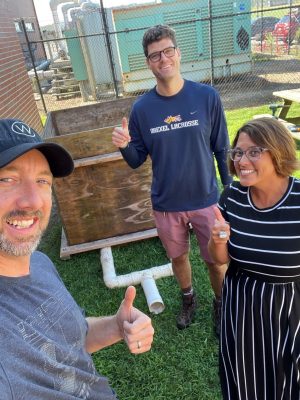
BERLIN – Officials say a new composting program has enabled students at a local high school to divert more than 300 pounds of food waste.
Since September, a group of students at Stephen Decatur High School have been hard at work composting scraps from the school’s cafeteria kitchen. Teacher Mandi Wells says the program, made possible through partnerships with Go Green OC and the Surfrider Foundation, is the first of its kind for Worcester County Public Schools.
“I know we’re the first school in the county to compost at this level, and I think we’re the first school on the shore to compost at this level …,” she said. “I think it’s great to be groundbreaking on environmental issues around the area. Hopefully once this gets out, other schools will see it and will want to start doing it as well.”
At the beginning of the school year, Wells – an advisor for the school’s Surfrider Club – partnered with Go Green OC and founder Josh Chamberlain to introduce a composting program at the Stephen Decatur. For the past four years, Go Green OC has partnered with The Hobbit Restaurant owner Garvey Heiderman to implement a composting program among Ocean City eateries.
“Mandi was encouraged by the way the city was accepting our program and moving into composting,” Chamberlain explained. “So she wanted to start the program at the high school.”
Utilizing micro bins from Go Green OC, and funds from the Surfrider Foundation to purchase equipment, students in Shannon Bone’s fifth-period science class took charge of the program by collecting, weighing and composting food scraps from the cafeteria.
“I think the biggest thing they’ve learned is teamwork because they had to share responsibilities …,” Bone said. “I think they also felt good about themselves by doing something good for the school and doing something good for the environment. They also liked being the founding class and having ownership of this program.”
To date, the school has collected more than 300 pounds of compost, which will be used on school grounds, Wells said. Bone added that the initiative has also gained the attention of school staff, who have started bringing in their own compost material.
“They are learning how we can offset our carbon footprint and improve this program,” she said.
As many of the students managing the program are ninth and 10th graders, Bone added they will be able to oversee the program as it grows in the coming years. The composting initiative will also be used to help Stephen Decatur apply for its Maryland Green School certification.
“For them, it’s their hard work that’s allowing our school to take a leap toward that,” she said.
Now knowing that the program can be successful, Wells noted the goal is to expand the school’s efforts with the help of Surfrider Club members.
“Next year or the end of this year, we might try setting out bins in the cafeteria for students who want to compost …,” she said. “We definitely want to move it to the actual cafeteria next year, but we have to work on promoting it the right way. That’s where I’m going to get my group involved.”
Chamberlain said Stephen Decatur’s composting program is an example of composting efforts that can be achieved at the school level. He added that proposed legislation moving through the Maryland General Assembly – House Bill 150 and Senate Bill 124 – could make such programs eligible for grant funding.
“We are encouraging our followers to send a letter to (Sen.) Mary Beth Carozza and encourage her to support that kind of legislation because it costs money to build these compost bins and maintain them,” he said. “Any money would be great, and we already have a bunch of schools reaching out to us wanting to do this.”

